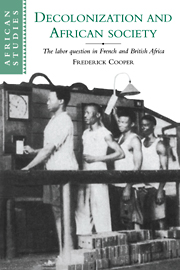Book contents
- Frontmatter
- Contents
- List of tables and figure
- Preface
- List of abbreviations
- Map of French and British colonial Africa
- 1 Introduction
- Part I The dangers of expansion and the dilemmas of reform
- Part II Imperial fantasies and colonial crises
- Introduction
- 5 Imperial plans
- 6 Crises
- Conclusion: modernity, backwardness, and the colonial state
- Part III The imagining of a working class
- Part IV Devolving power and abdicating responsibility
- Conclusion
- Notes
- Bibliography
- Index
- OTHER BOOKS IN THE SERIES
Conclusion: modernity, backwardness, and the colonial state
Published online by Cambridge University Press: 22 February 2010
- Frontmatter
- Contents
- List of tables and figure
- Preface
- List of abbreviations
- Map of French and British colonial Africa
- 1 Introduction
- Part I The dangers of expansion and the dilemmas of reform
- Part II Imperial fantasies and colonial crises
- Introduction
- 5 Imperial plans
- 6 Crises
- Conclusion: modernity, backwardness, and the colonial state
- Part III The imagining of a working class
- Part IV Devolving power and abdicating responsibility
- Conclusion
- Notes
- Bibliography
- Index
- OTHER BOOKS IN THE SERIES
Summary
At the end of World War II, colonial officials in France and Great Britain self-consciously put forth new conceptions and new justifications for colonial policy for the post-war years. A few years later, their policies and the thinking that lay behind them were indeed quite different from pre-war patterns, but not in the way officials expected. They found that they were facing not just a long-run problem of directed social change, but an immediate question of control. The challenge occurred at a time when imperial regimes were unusually open to the intellectual implications of policies and concerned about international scrutiny of their words and actions, and when the metropoles needed the imperial economy more than ever.
The challenges combined, at the same moment, colonial officials' best hopes and worst fears. From the Assemblée Nationale Constituante in Paris to the mass meetings of Mombasa and Dakar, officials not only heard their own words turned back at them, but they also saw the possibility that Africa's workers might express themselves through a familiar institution like a trade union. The social movements described in these pages seemed balanced on a knife's edge, taking modern forms but also revealing elements of a truly mass revolt, threatening at times to bring in the riff-raff of the city and the peasants of the countryside. Should the masses be mobilized by a Chege Kibachia or a Kwame Nkrumah, the danger could spill far beyond the context of urban workers and consumers, threatening the colonial state, and worse still its modernizing projects. However much colonial officials feared trade unions as a locus of power, the alternative was worse.
- Type
- Chapter
- Information
- Decolonization and African SocietyThe Labor Question in French and British Africa, pp. 261 - 270Publisher: Cambridge University PressPrint publication year: 1996

